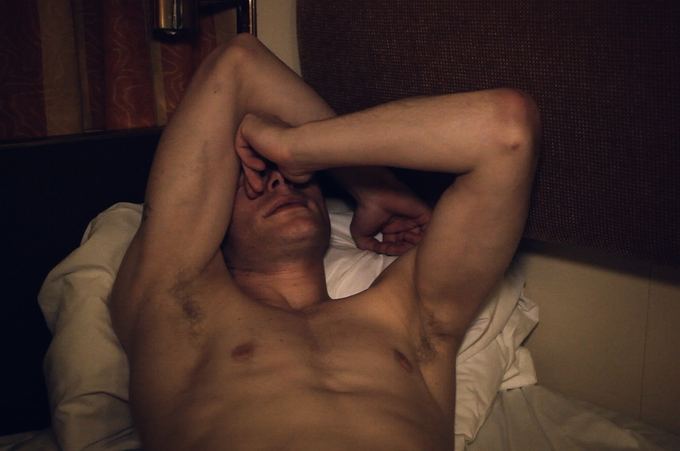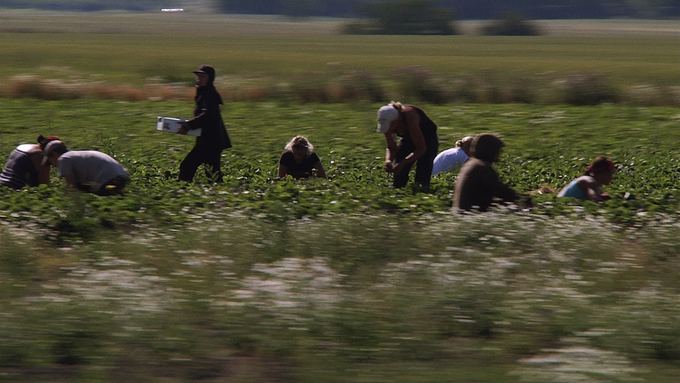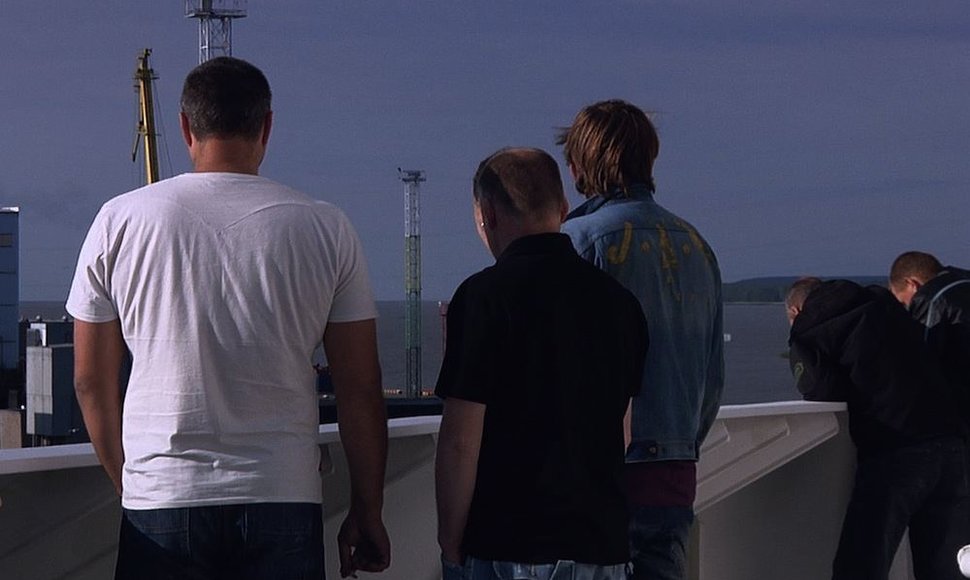She has recently presented her documentary feature “Second Class” which depicts the lives of Lithuanian workers toiling in forests in the north of Sweden.
Dirty labour six nights a week, miserable living conditions, streams of Russian swearwords, alcohol, occasional smile-inducing talks about life, irony, and dreams of a new car. All this betrays an underlying inferiority complex, distrust, and a sense that these people do not get any respect.
Reluctance to arouse pity
 |
| Nuotr. iš asmeninio albumo/Producer Elisabeth Marjanovic Cronvall (left) and director Marta Dauliūtė |
Almost an hour of screen time is taken up by negotiations – the men asking the filmmaker to turn of the camera, showing their reluctance to talk about themselves for fear of becoming characters on just another weepy TV story on Lithuanian migrant workers.
They keep asking: What level of sentimentality is the filmmaker going for? Is she trying to make her audience weep? Who is the film intended for – sophisticated film festival audiences or the Swedes for whom they work and who will come to pity them? One hero is blunt: An earthquake would make for a more interesting subject. “Nothing special, half of Lithuania is eating the same shit.”
Some characters – Lithuanians working or studying in Sweden – reproached Dauliūtė. Why has she chosen seasonal workers to represent the country and not bankers or professionals?
“What does it mean when someone is deemed not beautiful enough to represent others? What is this darn thing, being “first class”? Everyone says: if you feel that you belong to it, then you do. But then they go and suggest I film “first-class” people. This is nothing short of social racism!” Dauliūtė is indignant. “By calling our film “Second Class” we want to invite the viewers to discuss how the Lithuanian and the Swedish societies regard these people.”
 |
| Screenshot/„Second Class“ |
Sense of alienation
The filmmaker does not call her heroes emigrants – the latter, she believes, leave home of their own free will. The people in her film are periodically driven out to work under appalling conditions by the economic situation they are in. Even though the young men must toil in Sweden, they are still in Lithuania, physically and mentally, coming back home in between periods of intense labour.
 |
| Screenshot/"Second Class“ |
“When you do not wish to emigrate but are forced to work elsewhere – some people must feed their families, others want to make a better living – and you do not know the language nor believe in yourself that much, you are alien to that society.
“People like that are not hard to identify. I think every Lithuanian has a little bit of that in himself. At least our parents' generation. Even those who have jobs in banks. That's why they are needed – to represent us well, to inspire our self-confidence. We want to look more beautiful, since we all are second class,” Dauliūtė says.
Third-cheapest labour
According to Elisabeth Marjanovic Cronvall, producer of the documentary, the film depicts present-day Europe where some people must be cheaper so that the economy can move forward. Lithuanian workers, one hero volunteers, are the third-cheapest labour on the market. But then he adds, instantly, that he does not think himself any inferior to Swedes.
 |
| Screenshot/"Second Class" |
Another hero regrets that he hasn't managed to graduate from a secondary school, but says he wants to receive education. But when it is suggested that he study economics, he laughs. Yet the guys share their plans, in straight faces, to buy a good car when they go back to Lithuania.
“One of them says: I want a family, a house, a car. In other words, love, security, status and respect. Everyone needs that. I do too. Why should these needs take some exotic forms?” Dauliūtė asks.
Long search
It was Dauliūtė's own experience that suggested the subject for the film. She has been living on the other side of the Baltic Sea for 11 years and currently runs the Swedish Independent Filmmakers Union. She says that she feels more like an emigrant when she is in Lithuania, where her parents still live, than an immigrant in Sweden. It is, after all, the country where she came of age, graduated, she speaks fluent Swedish.
 |
| Screenshot/"Second Class" |
The filmmaker did not have a worked-out script when she began shooting. It all started several years ago, when she took her camera on a ferry – the images she captured are seen in the opening shots of “Second Class.” She found some of her characters through Lithuanian employment agencies who offer jobs in Sweden.
None of the people she met were thrilled to be filmed – and that suggested the idea about a certain social marginalization, about social attitudes towards migrant workers. Dauliūtė filmed a hundred or so people before she found Artūras and Ernis, the main characters in her feature.
The two workers live, it would seem, in a perfect place, surrounded by forests and lakes. Fifty-odd workers are based in a small village, living in a former school. The population of the village is a mere hundred people, so there is no need for a school any more. The workers sleep in classrooms, 3-5 people in each, between walls covered with old posters with instructions on healthy diet.
Newcomers pose a threat?
Among her interviewees, Dauliūtė has also met well-educated people who are fluent in English and who used to work in the United Kingdom: theatre directors, musicians, teachers, basketball players, students who need money to carry on with their studies.
What do Swedes make of these newcomers? Marnajovic Cronvall, the producer, says that similar moods prevail throughout crisis-stricken Europe: The newcomers allegedly threaten “our” security, culture, and tradition. Greece, for instance, has become particularly racist; in Sweden, too, an ultra-rightist party is very popular at the moment, she says.
 |
| Screenshot/"Second Class" |
Marta Dauliūtė
Dauliūtė was born in 1984, in Šiauliai. She left for Sweden at seventeen, graduated from a gymnasium in Bromölla, southern Sweden. She studied filmmaking in Fridhem College and received a BA from Göteborg Film Academy in 2008. Her diploma piece – the short “Tri dnia” (“Three Days”) – also deals with migrants from Lithuania.
 |
| Juliaus Kalinsko/„15 minučių“ nuotr./ Director Marta Dauliūtė |
Dauliūtė heads an independent filmmakers union, OFF, works as a producer and director, co-owns a film production company, MDEMC.
In 2010, she produced a film, “Inte panik” (“No Panic”), which won the best short award at Upsala International Film Festival. It was also nominated for the Swedish Film Institute award.
Dauliūtė has worked on a dozen of films already, in various capacities: as a director, producer, assistant director, set artist, in casting.



















